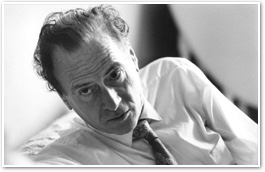Great Conversion Stories: Marshall McLuhan
- JOHN JANARO
In the 1960s and 1970s, a new kind of media called "television" entered homes everywhere as an immense expansion of access to information and entertainment.
 Marshall McLuhan
Marshall McLuhan1911-1980
It brought amazing but also sometimes unsettling changes to ordinary life.
Marshall McLuhan had studied communications and popular culture for years, but his provocative analysis of television and what he called "new media" struck a chord in those days. The tweedy, articulate literature professor at the University of Toronto seemed to have rich insights into how these technologies were changing our ways of understanding and relating to one another, and how they might develop further in the future.
Thus, McLuhan became something of a celebrity in North America in the midst of the tumultuous whirlwind of the 1960s. He was indeed a pioneer in "media studies" and created many of the terms we use today, such as "feedback," "software," and "interface." He also coined the term "global village" for the worldwide interaction made possible by instantaneous electronic communications technology. In some ways McLuhan was truly prescient; there is renewed interest in his work today as it pertains to the Internet and social media.
What is often overlooked is that McLuhan was an ardent convert to the Catholic Faith. Born in Western Canada in 1911, he was raised in a generically Protestant environment. By the time he attended the University of Winnipeg in 1928 he had no interest in religion. Just prior to going on to England to study at Cambridge, however, he chanced upon the works of an author who changed his whole view of reality: G.K. Chesterton.
In the common sense, wit, and striking paradoxical expressions of Chesterton, McLuhan discovered the wonder of the real world as created by God and full of meaning. He was also introduced to the crucial role of the Catholic Church in fostering learning and culture in European history. By the time he left Cambridge and returned to Canada in 1936, he had an intellectual conviction about the Church. But he felt no personal need for religion.
When friends asked him, "Why aren't you Catholic?" he was as puzzled as they were. Then he realized he couldn't have Catholic faith by looking at the Church "from the outside." He needed to approach the Church on her own terms, with the realization that faith comes from grace, and in order to receive this gift he had to pray. So McLuhan began praying, and thereby he entered into the Church's life and felt her maternal embrace. He also met a priest, Father Gerald Phelan (later his colleague at the University of Toronto) who guided his discernment and baptized him when he finally found faith in 1937.
In all his subsequent intellectual investigations of literature, media, and modern culture, McLuhan remained rooted in the conviction that reality was created and redeemed by the Incarnate Word. He insisted that media technology not only delivered content but also created an environment that shaped the perception of what was conveyed. These factors in secular media are ambivalent; they can be developed in promising ways but they can also be dangerous. McLuhan was not afraid to endeavor to understand media, however. He recognized the analogy to the fundamental communication he had experienced when he encountered the living Word made flesh in the Catholic Church.
 This is Meaghen Gonzalez, Editor of CERC. I hope you appreciated this piece. We curate these articles especially for believers like you.
This is Meaghen Gonzalez, Editor of CERC. I hope you appreciated this piece. We curate these articles especially for believers like you.
Please show your appreciation by making a $3 donation. CERC is entirely reader supported.

Acknowledgement
 John Janaro. "Great Conversion Stories: Marshall McLuhan." Magnificat (October, 2018).
John Janaro. "Great Conversion Stories: Marshall McLuhan." Magnificat (October, 2018).
Reprinted with permission of Magnificat.
The Author

 John Janaro is Associate Professor Emeritus of Theology at Christendom College. He is a Catholic theologian, and a writer, researcher, and lecturer on issues in religion and culture. He is the author of Never Give Up: My Life and God's Mercy and The Created Person and the Mystery of God: The Significance of Religion in Human Life. He is married to Eileen Janaro and has five children.
John Janaro is Associate Professor Emeritus of Theology at Christendom College. He is a Catholic theologian, and a writer, researcher, and lecturer on issues in religion and culture. He is the author of Never Give Up: My Life and God's Mercy and The Created Person and the Mystery of God: The Significance of Religion in Human Life. He is married to Eileen Janaro and has five children.




